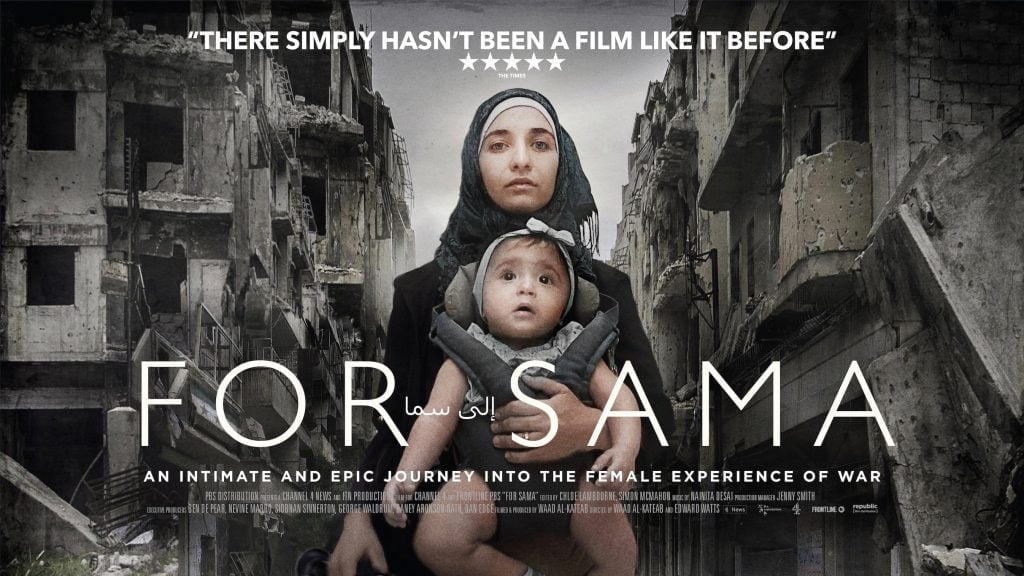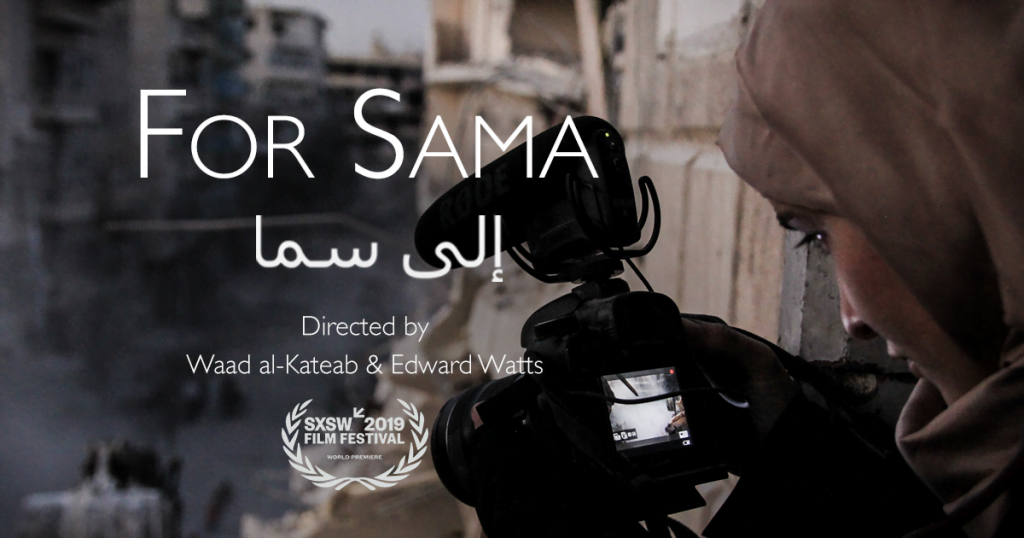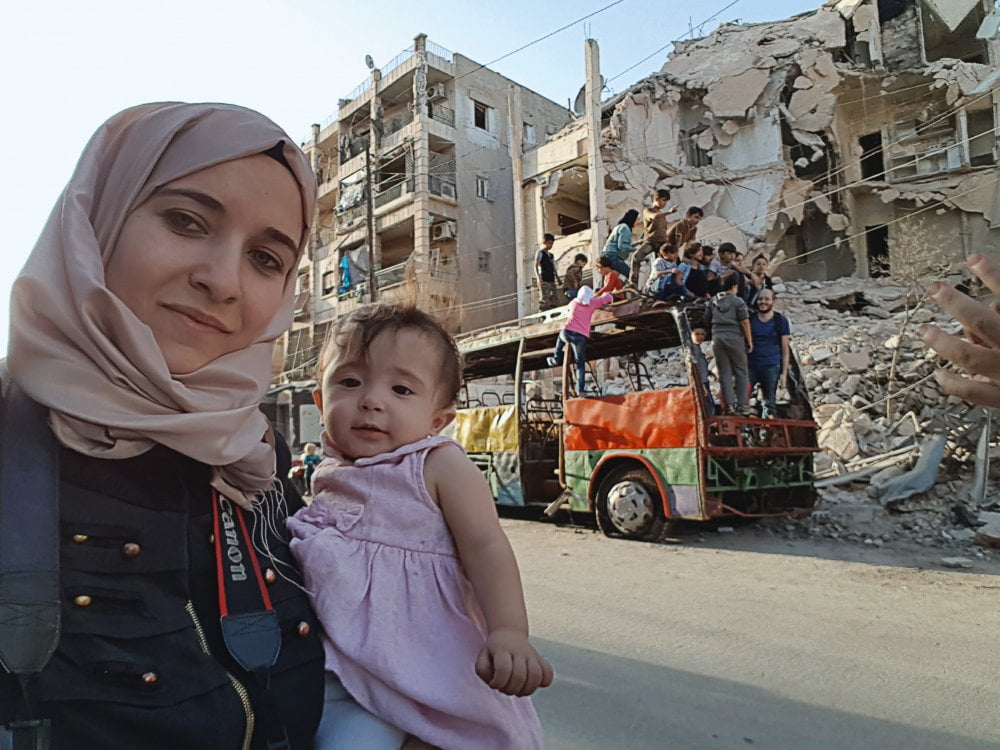The outbreak of Syrian Civil war violence in 2011 saw an estimate of 500,000 video clips being uploaded making it one of the first YouTubed revolutions in history. Even though the world chose to remain largely silent, everything came to a standstill when pictures of unrest from the streets of Aleppo started flooding social media daily. The message was clear: we failed Syria and its citizens yet again.
And, while new media technologies have admittedly been representative of hope in presenting the brutal realities of conflict to the world, truth is often the first casualty. Ultimately, it’s a handful of films and documentaries where filmmakers capture the present and dynamic realities of war where one finds a possibility of truth.
Premise
For Sama, is a raw vlog-style documentary, filmed and narrated by Waad Al-Kataeb over five years covering the bloody war of Syria. At the time of initial filming, Al Kataeb was an incoming student at Aleppo University, a city that became the prime site of anti-government dissent in Syria. The film documents her journey as she falls in love, marries, and gives birth to her first child, Sama all whilst living through the uncertainties of a siege. The film’s title is a cinematic letter to Al- Kataeb’s daughter, who she names Sama, meaning sky as she explains why they made the conscious choice of staying back.
The Film
From the very beginning, we see the personal dilemmas of Al Kataeb intertwined with the political unrest around her. The film begins with her singing a lullaby to her newborn daughter. Moments later, we see her running frantically amidst the chaos through a bombed hospital, calling out for Sama. This fear of Sama’s safety is actualized many times as one runs through the film. Al Kataeb’s plight is conveyed when in the first few minutes of the film, she tells Sama, “You’re the most beautiful thing in our life. But what a life I have brought you into. You didn’t choose this. Will, you ever forgive me?“.
This fear of Sama’s safety is actualized many times as one runs through the film. Al Kataeb’s plight is conveyed when in the first few minutes of the film, she tells Sama, “You’re the most beautiful thing in our life. But what a life I have brought you into. You didn’t choose this. Will, you ever forgive me?“.

In an interview with the Middle East Eye, Al Kataeb explains her intent behind the film,
“As with many other activists, we felt that one of our tools was to film what we were watching and seeing with our own eyes. So I raised my phone and started filming some of these protests…giving the truth and reflecting the reality of living under those circumstances. During that situation, you can’t really separate yourself. Are you a filmmaker or are you a mother or are you just Waad as a person? So everything I was doing was mixed between all these things together.”
Also read: Women And The Challenging Art of Documentary Filmmaking
There is certainly a moral duality that seems to be present. She is seen juggling through many roles—first as a young activist and later as a mother. She is seen to love her people and her country so much that she feels that simply running from the matter (even to save her daughter) would be selfish in one way and an insufferable loss to tyranny and fear. This film is her opportunity to show the rest of the world what is happening in Syria, in all its brutal honesty. But all the more, it’s her courage, selflessness, the pursuit of truth, and undying hope for a revolution that shows the astoundingly beautiful and terrifying truth of life and death.
Another interesting aspect of the film is that it lets viewers dive deeper into the multiple layers of conflict by putting children at the center of it. Whether through Sama’s eyes or through young children who lost their loved ones, the film remarkably shows how children are increasingly becoming collateral damage in this conflict.
The film is also a wonderful commentary on the need for filmmakers to adopt an egalitarian language in their response to war. Waad captures and acknowledges the struggles of Syrian women as they navigate through the realities of war. She brilliantly captures the underlying complexities that shape the lives of these women and contextualises her personal experiences in the larger debate around revolutions and resistance. Through her camera, she paints a vivid picture of how she and many other women like her, had to fit themselves into new roles, and come to terms with gut-wrenching realities of loss and the periodic winds of hope that pass by.
The Female Gaze
Throughout the film, Waad gives the viewer an interesting look into the Aleppo siege as a female Syrian insider. This feminist perceptive of war is imperative because it is this representative telling of truth that makes a difference for documentary filmmakers. In the end, Waad has won the battle of a powerful storyteller by recognizing that representation matters, and not in a tokenistic sense. She consciously transitions and draws a parallel in scenes of war and everydayness in women’s lives to tell a story that is often absent from the larger stories.
This feminist perceptive of war is imperative because it is this representative telling of truth that makes a difference for documentary filmmakers. In the end, Waad has won the battle of a powerful storyteller by recognizing that representation matters, and not in a tokenistic sense.

As a young woman living in conflict, in many ways, Waad’s plight struck closer to home. However, I do not wish to draw any parallels in my review of the documentary. Her understanding as a female filmmaker living through conflict has given us an invariable feminist perspective of Syrian cinema and documentary filmmaking.
Also read: Feminism and Film-making: An Insight Into Indian Filmmakers
But in many ways, the film is a way forward for the world to recognize that women are claiming agency within their respective realities. For Syria and many other places that constantly live under the fear of tyranny and violence, a woman’s perspective will redefine the subject of documentary filmmaking altogether. In the end, the hope from this documentary is to allow the viewer to feel what is seen and present a feminist experience of war as an imperative part of seeking the truth.
Featured Image Source: For Sama Film Site
About the author(s)
Trying to find her sociological imagination. Often finds solace in books and some soulful Sufi music.




